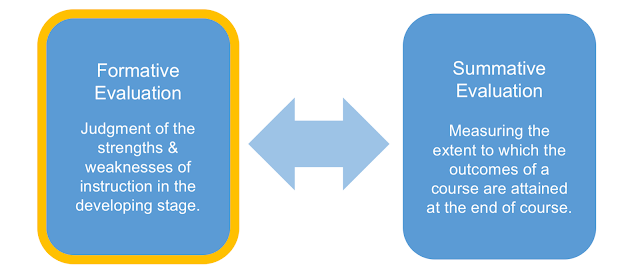Formative Evaluation: Today I want to share with you in this post a term intimately linked to evaluation. It is about the formative evaluation , an expression that from time to time is being worked in an increasingly conscious way in the classrooms and that is intimately linked to the competence assessment or competence.

Do you want to know what the formative evaluation consists of? Do you want to discover what relationship does it have with the learning process and the competences of the students? If so, I will be happy to be with you in reading this article. So, without further delay, we set sail ...
And what role does formative evaluation play in this regulatory process? I quote from the book by Neus Sanmarti:
The formative evaluation seen from a traditional perspective.
From a traditional point of view , it has tended to understand the formative evaluation as one focused on identifying the errors of the students . Thus, the regulation of this type of evaluation focuses on:
This vision has made that on many occasions the formative evaluation is related to tests or conventional exams that the teacher corrects and scores. The scheme would be the following:
get to understand why a student does not understand a concept or does not know how to perform a certain task .
This view is what gives us to understand is that there is a greater interest in the procedures than the result itself. In this vision, the feedback that the teacher gives the student becomes essential because the tasks are returned with enriching comments, but also affecting the successes.
What is achieved with this cognitive vision of formative evaluation?
What is achieved mainly is that teachers can design strategies that are not based on repetition and focus almost exclusively on a specific learning difficulty , that is, they focus on feedback rather than repetition. And this is demonstrated in large part when a student is given a test with only one note. What kind of improvement can there be with this single note?
On the other hand, when there is a return of a test or task in which enriching comments appear of what has been done well and what can be improved, the student's predisposition for change is noticeably greater.
2. Evaluation while you are learning . It is considered the most important evaluation in relation to learning outcomes. In this evaluation, the greatest value is to make the student able to detect their difficulties, understand them and self-regulate them. Therefore, insists more on the process than on the result.
3. The final evaluation . This evaluation is intended to help students recognize what they have learned, in addition to being aware of the differences between the starting point and the arrival of a content.
Evaluate to learn. Evaluate to self-regulate.
Formative Evaluation
In this article I intend to clarify what this term consists of. And I will do it from the excellent manual written by Neus Sanmarti and titled 10 key ideas. Evaluate to learn , from the Editorial Grao.
Do you want to know what the formative evaluation consists of? Do you want to discover what relationship does it have with the learning process and the competences of the students? If so, I will be happy to be with you in reading this article. So, without further delay, we set sail ...
What is formative evaluation?
Neus Sanmarti in his book insists that evaluation, above all, must be a useful evaluation to learn . But in addition to being useful, it must also have a regulatory purpose , that is, it must be capable of regulating the learning process itself.And what role does formative evaluation play in this regulatory process? I quote from the book by Neus Sanmarti:
" Formative evaluation refers to all those activities carried out by teachers and students when they evaluate themselves, and which give information that can be used to review and modify the teaching and learning activities with which they are committed ." (Black and Williams, 1998a)
The formative evaluation seen from a traditional perspective.
From a traditional point of view , it has tended to understand the formative evaluation as one focused on identifying the errors of the students . Thus, the regulation of this type of evaluation focuses on:
The reinforcement of the correct answers
the rectification of errors from the performance of more exercises or tasks of a specific learningThis vision has made that on many occasions the formative evaluation is related to tests or conventional exams that the teacher corrects and scores. The scheme would be the following:
- Explanation of the teacher.
- Realization of exercises.
- Test or qualifying exam (eg from 0 to 10).
- In case of not passing the test or exam, more exercises are performed similar to those of step 2.
The formative evaluation from a cognitivist vision.
If we approach the concept of formative evaluation from a cognitivist perspective , we will see how it focuses on understanding the congitive functioning of the student before the tasks that are proposed. Therefore, in the words of Neus Sanmarti, what is involved in this type of evaluating vision isget to understand why a student does not understand a concept or does not know how to perform a certain task .
This view is what gives us to understand is that there is a greater interest in the procedures than the result itself. In this vision, the feedback that the teacher gives the student becomes essential because the tasks are returned with enriching comments, but also affecting the successes.
What is achieved with this cognitive vision of formative evaluation?
What is achieved mainly is that teachers can design strategies that are not based on repetition and focus almost exclusively on a specific learning difficulty , that is, they focus on feedback rather than repetition. And this is demonstrated in large part when a student is given a test with only one note. What kind of improvement can there be with this single note?
On the other hand, when there is a return of a test or task in which enriching comments appear of what has been done well and what can be improved, the student's predisposition for change is noticeably greater.
What three great moments are identified in the teaching process?
1. The initial evaluation . Its purpose is to analyze the situation of each student before starting a specific teaching-learning process. This evaluation allows the teacher and the student to become aware of what the starting point is and how the contents should be adapted from the detected needs.2. Evaluation while you are learning . It is considered the most important evaluation in relation to learning outcomes. In this evaluation, the greatest value is to make the student able to detect their difficulties, understand them and self-regulate them. Therefore, insists more on the process than on the result.
3. The final evaluation . This evaluation is intended to help students recognize what they have learned, in addition to being aware of the differences between the starting point and the arrival of a content.
The formative evaluation. In conclusion.
The formative evaluation is an evaluation modality that takes place during the teaching-learning process and whose purpose is to detect the difficulties, but also the progress of the students. And it is precisely those difficulties and progress that allow the teacher to adapt his didactic process to the needs of his students. That's where its regulatory purpose comes from.Evaluate to learn. Evaluate to self-regulate.




